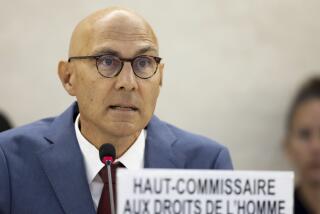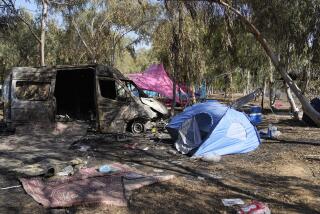U.N. Elections Chief Accused of Harassing Staff, Misusing Funds
- Share via
UNITED NATIONS — Adding to the U.N.’s credibility woes, an internal review of its electoral assistance division accuses the director, Carina Perelli, with sexual and workplace harassment, misuse of funds and favoritism.
The confidential management review, which was obtained by The Times, described the electoral unit as an “unhealthy family” and the work environment as abusive. Working for Perelli has been “nothing short of a devastating experience,” a subordinate is quoted as saying.
A U.N. spokesman, Fred Eckhard, said there would be a follow-up investigation. Perelli told The Times that she was preparing a written response to the report and was not ready to speak to media.
As the United Nations struggles to restore its public trust after a series of scandals involving the Iraq “oil for food” program, sexual abuse by peacekeepers and sexual harassment at the highest levels of the organization, Secretary-General Kofi Annan has highlighted the U.N.’s success in helping organize Iraq’s Jan. 30 election under harsh conditions.
But the new criticism is likely to erode the reputation of one of the world body’s most solid pillars even as it is helping to prepare Iraq’s next round of elections. U.N. officials say the report’s timing betrays how strongly internal disagreements about the U.N.’s role in postwar Iraq still resonate and how a Cabinet shake-up may have unearthed buried resentments.
The review, conducted by an outside consultant that has often worked with the U.N., was commissioned in December by the head of political affairs, Kieran Prendergast, to explore staff complaints that came to light during a previous assessment by the firm, the report said.
Its findings were “much more serious” than expected, it said. Besides extensive recommendations for improving organization and practices, the report urged an official investigation of the sexual and professional harassment allegations and reports of unjustified use of electoral funds, often for travel.
Staff members said Perelli had created a work environment in which sexual innuendo was constant, something she considered “conducive to collegiality.” Some, however, found it offensive and were led by the situation to leave the division. The report cites unwelcome sexual advances, inquiries into staff members’ intimate lives and public derision of their responses, as well as unwelcome information about sexual exploits.
Employees complained that her management style was abusive and derogatory and that her assignments were unreasonably challenging. They said she favored an inner circle of staffers who received preferential treatment and were sent on special trips, while others were exiled on extended missions abroad to keep them out of the office.
Perelli, a 48-year-old Uruguayan political scientist, has headed the electoral division for nine years and directed elections in hot spots around the world, among them Iraq, the Palestinian territories, Afghanistan, East Timor, Colombia, Liberia and Haiti.
The report notes that Perelli “is admired for her personal courage, for her knowledge of the issues and for her willingness to share that knowledge.” Her friends call her the quintessential fieldworker, whose character was forged fighting military rule in Uruguay. They describe her as a woman with a passion for food, dancing and pleasure. Her status as the youngest woman of her rank, who has achieved success under arduous conditions, has bred resentment among higher-ups, they say.
But even her friends concede that she has an abrasive style. Some of the 29 past and present staffers interviewed for the assessment said that working with her was “emotionally devastating.”
Although her boss, Prendergast, declined to comment, the report refers to a “very public dispute” between the two that U.N. staffers say has its roots in their disagreement over how involved the U.N. should be in Iraq.
After 22 U.N. workers were killed in a suicide bombing at the organization’s Baghdad offices in August 2003, Annan withdrew all nonessential staff members and kept them out of Iraq until Perelli led a small electoral team on a fact-finding trip there in February 2004. When the U.N. agreed to help prepare for the elections that were held in January, Perelli argued that the electoral experts needed to return in force to help organize the balloting and train Iraqi workers.
Prendergast, who had opposed the U.S.-led invasion and did not want to risk U.N. lives unless they had a task that would justify the risk, disagreed.
Perelli eventually took a team of electoral workers to Mexico for extensive training, and the group then trained hundreds of others. In the end, the election was considered a success, and President Bush referred to her by name twice in his State of the Union address.
But that and numerous other feats led to a sense of impunity, some said in the report, and contained the roots of her failure. “Many aspects of her personal and managerial behavior suggest that she does not, in fact, feel bound by the rules,” the report said.
Other sources suggest that her boss, who is scheduled to leave his post prematurely in June as part of the changes in the U.N. Cabinet, saw this as his last chance to instigate reform -- or bring her down -- before his own departure.
More to Read
Sign up for Essential California
The most important California stories and recommendations in your inbox every morning.
You may occasionally receive promotional content from the Los Angeles Times.













